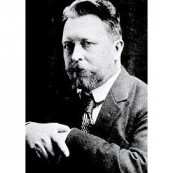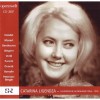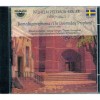传记
Olof Wilhelm Peterson-Berger (27 February 1867, Ullånger, Ångermanland – 3 December 1942, Östersund) was a Swedish composer and music critic. As a composer, his main musical influences were Grieg, August Söderman and Wagner as well as Swedish folk idiom.
Peterson-Berger studied at the Stockholm Conservatory from 1886–89 and then in Dresden for a year.[2]
He is best known for three albums of national romantic piano pieces entitled Frösöblomster I, II and III (Flowers of Frösö), which includes the often performed Vid Frösö kyrka (At Frösö Church) and Sommarsång (Summer Song). The sets, which were composed over a period of 18 years (1896 - 1914) and brought together afterwards as a collection have gained a reputation of representing a quintessential "Swedishness" in the romantic, nationalistic vein of their time. The most famous of the pieces, Sommarsång (Summer Song) recalls the warm, calm, harmonious and bright pre-summer evenings where the sun in the north almost never goes down; they were the great breakthrough for Wilhelm. Sommarsång is still known to most Swedes, even to people generally uninterested in music: the majority of young piano students in the Nordic countries have been taught this piece. His songs for vocal ensemble are also still regularly performed, and are part of the core repertoire of Swedish choirs.
His other works include the five symphonies - among them are no.2 Sunnanfärd and no.3 Same-Ätnam generally considered the best - as well as the operas Ran, Arnljot, Domedagsprofeterna ("The Doomsday Prophets") and Adils och Elisiv ("Adils and Elisiv"). His command of the larger forms, in both architecture and instrumentation, is disputed.
He was stage manager at the Stockholm Opera from 1908-10. The opera Arnljot has nevertheless become something of a symbol for the province of Jämtland and is regularly performed there, as a "musical drama", at Arnljotlägden on Frösön, close to Peterson-Berger's former home, Sommarhagen. Domedagsprofeterna is the antithesis of Arnljot – a light festive musical comedy set in 17th century Uppsala, while the saga Adils och Elisiv where Swedish ‘talsång’ (speechsong) attained its purest expression is a work extolling Peterson-Berger's belief in humanism and the goodness of man.[1]
He also wrote about eighty songs, many of which set poems by Erik Axel Karlfeldt, for example Aspåkerspolska.








